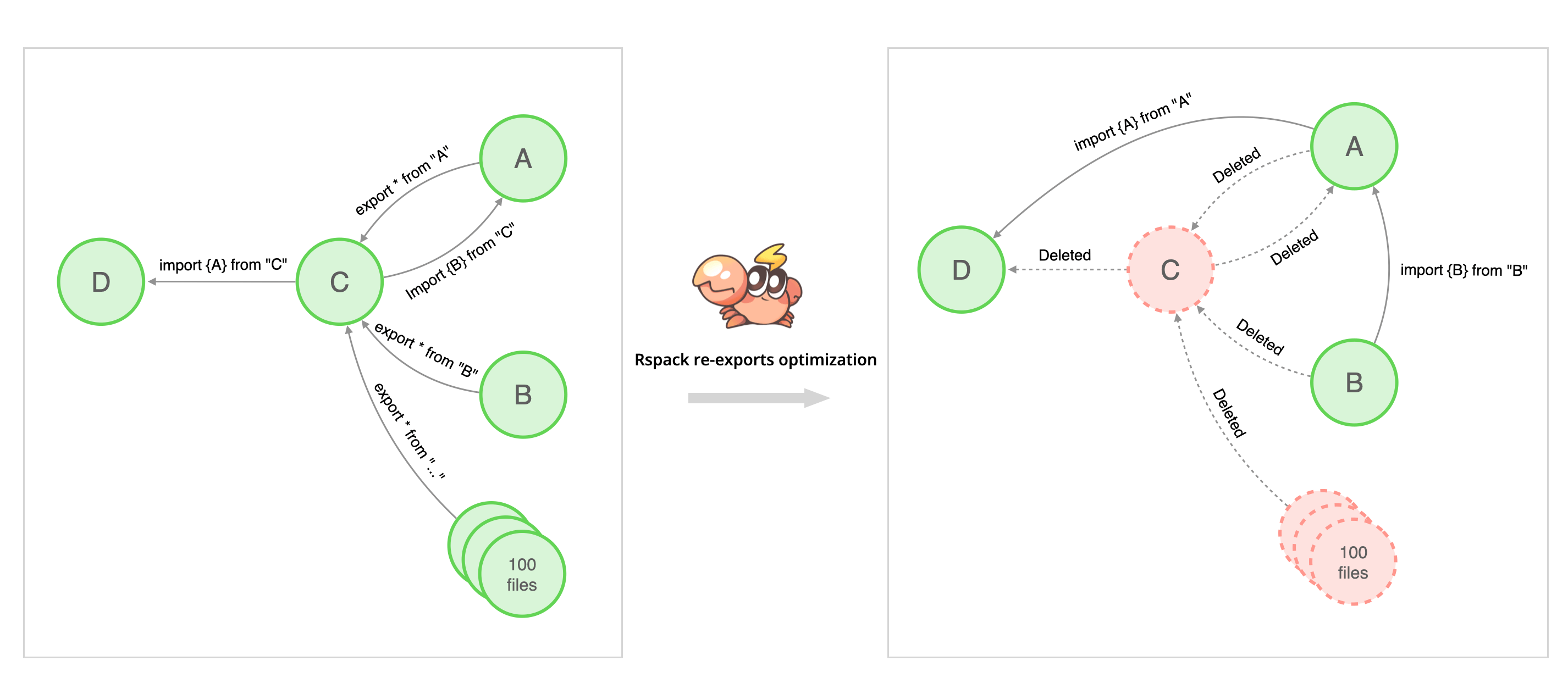CC 4.0 协议声明本节内容派生于以下链接指向的内容 ,并遵守 CC BY 4.0 许可证的规定。
以下内容如果没有特殊声明,可以认为都是基于原内容的修改和删减后的结果。
Tree shaking
Rspack 支持 tree shaking,这是在 JavaScript 上下文中常用的术语,用于描述死代码的删除。
它依赖于 import 和 export 语句来检测代码模块是否被导出和导入以在 JavaScript 文件之间使用。
当你将 mode 设置为 production 时,Rspack 将默认启用 tree shaking。
Basic tree shaking
rspack.config.js
/**
* @type {import('@rspack/core').Configuration}
*/
const config = {
mode: 'development',
entry: {
index: './src/index.js',
},
output: {},
};
module.exports = config;
./src/index.js
import { cube } from './math.js';
function component() {
const element = document.createElement('pre');
element.innerHTML = ['Hello webpack!', '5 cubed is equal to ' + cube(5)].join(
'\n\n',
);
return element;
}
document.body.appendChild(component());
./src/math.js
export function square(x) {
return x * x;
}
export function cube(x) {
return x * x * x;
}
注意到,我们没有从 src/math.js 模块导入 square 方法。该函数是“死代码”,表示应该被删除的未使用的导出。现在构建我们的项目
将产生以下构建结果:
// ... 省略一些不重要的代码
var __webpack_modules__ = {
'./src/index.js': function (module, exports, __webpack_require__) {
'use strict';
Object.defineProperty(exports, '__esModule', {
value: true,
});
var _mathJs = __webpack_require__('./src/math.js');
function component() {
const element = document.createElement('pre');
element.innerHTML = [
'Hello webpack!',
'5 cubed is equal to ' + (0, _mathJs.cube)(5),
].join('\n\n');
return element;
}
document.body.appendChild(component());
},
'./src/math.js': function (module, exports, __webpack_require__) {
'use strict';
Object.defineProperty(exports, '__esModule', {
value: true,
});
function _export(target, all) {
for (var name in all)
Object.defineProperty(target, name, {
enumerable: true,
get: all[name],
});
}
_export(exports, {
square: function () {
return square;
},
cube: function () {
return cube;
},
});
function square(x) {
return x * x;
}
function cube(x) {
return x * x * x;
}
},
};
// ...
正如你所看到的,如果我们不启用 tree shaking,所有代码都保持不变,只是将代码包裹了一层运行时代码。
现在,我们切换到 production 模式,重新构建项目,为了让产物更加可读,我们同时关闭 minimize 选项 以及切换 moduleIds 为 named,为了和后面章节对比,我们关闭 optimization.sideEffects。
rspack.config.js
/**
* @type {import('@rspack/core').Configuration}
*/
const config = {
mode: 'production',
entry: {
index: './src/index.js',
},
+ optimization: {
+ sideEffects: false,
+ moduleIds: 'named',
+ minimize: false
+ }
};
module.exports = config;
重新构建项目后,square 函数将会被删除。
SideEffects
在一个 100% ESM 模块化的世界里,识别副作用是比较直接的。然而,我们还没有达到那个阶段 (在实际的生产代码中有各种格式的代码混用,cjs、esm 和 umd 等等),所以在此期间,需要在你的代码中提供“纯度”方面的提示给 Rspack 的编译器。
该功能通常由 "sideEffects" package.json 属性来完成的。
package.json
{
"name": "your-project",
"sideEffects": false
}
sideEffects 字段支持以下值:
- false 这个包中的所有文件都没有副作用。
- string 匹配包含副作用文件的 glob。
- Array<string> 匹配包含副作用文件的 glob 数组。
- undefined 当你不设置
package.json 的 sideEffects 时的默认值。当 optimization.sideEffects 为 true 时,Rspack 将尝试分析代码是否具有副作用,当 optimization.sideEffects 为 'flag' 时,Rspack 将默认包中的所有模块均有副作用。
这次,我们使用一个更复杂的示例。
rspack.config.js
/**
* @type {import('@rspack/core').Configuration}
*/
const config = {
mode: 'production',
entry: {
index: './src/index.js',
},
optimization: {
moduleIds: 'named',
minimize: false,
},
};
module.exports = config;
index.js
import { multiply } from 'math';
console.log(multiply(2, 3));
node_modules/math/package.json
{
"name": "math",
"sideEffects": false
}
node_modules/math/index.js
export * from './add.js';
export * from './multiply.js';
export * from './subtract.js';
node_modules/math/subtract.js
export const subtract = (a, b) => a - b;
node_modules/math/multiply.js
export const multiply = (a, b) => a * b;
node_modules/math/add.js
const randomDate = Date.now();
export const addRandomDate = a => a + randomDate;
export const add = (a, b) => a + b;
变量 randomDate 在默认情况下是需要被保留的,因为它在模块初始化时期包含副作用。
但是,由于 package.json 中包含了 sideEffects 字段,且值为 false,除此之外在 add.js 中没有使用任何导出变量,因此整个模块都可以被跳过,subtract.js 同理。
//...
var __webpack_modules__ = {
'./node_modules/math/index.js': function (
module,
exports,
__webpack_require__,
) {
'use strict';
Object.defineProperty(exports, '__esModule', {
value: true,
});
__webpack_require__.es(
__webpack_require__('./node_modules/math/multiply.js'),
exports,
);
},
'./node_modules/math/multiply.js': function (
module,
exports,
__webpack_require__,
) {
'use strict';
Object.defineProperty(exports, '__esModule', {
value: true,
});
Object.defineProperty(exports, 'multiply', {
enumerable: true,
get: function () {
return multiply;
},
});
const multiply = (a, b) => a * b;
},
'./src/index.js': function (module, exports, __webpack_require__) {
'use strict';
Object.defineProperty(exports, '__esModule', {
value: true,
});
var _indexJs = __webpack_require__('./node_modules/math/index.js');
console.log((0, _indexJs.multiply)(2, 3));
},
};
// ...
module.rule.sideEffects
你可以使用 module.rule.sideEffects 覆盖某些模块的 sideEffects 选项。
为什么我们需要这样的功能呢?我们仍然使用上面的例子,假设 math 包的作者忘记在 package.json 中添加 sideEffects 选项:
node_modules/math/package.json
{
+ "name": "math"
- "name": "math",
- "sideEffects": false
}
Rspack 将尝试安全地分析代码,并仅在所有顶级语句均没有副作用时标记模块为无副作用。
正如我们所看到的,math/index.js、math/subtract.js 和 math/multiply.js 都没有副作用,而 math/add.js 不是,因为 const randomDate = Date.now() 含有副作用。当我们重新构建项目时,你可以看到差异如下:
//...
var __webpack_modules__ = {
"./node_modules/math/index.js": function (module, exports, __webpack_require__) {
"use strict";
Object.defineProperty(exports, "__esModule", {
value: true
});
__webpack_require__.es(__webpack_require__("./node_modules/math/multiply.js"), exports);
+__webpack_require__.es(__webpack_require__("./node_modules/math/add.js"), exports);
},
"./node_modules/math/multiply.js": function (module, exports, __webpack_require__) {
"use strict";
Object.defineProperty(exports, "__esModule", {
value: true
});
Object.defineProperty(exports, "multiply", {
enumerable: true,
get: function() {
return multiply;
}
});
const multiply = (a, b)=>a * b;
},
+"./node_modules/math/add.js": function (module, exports, __webpack_require__) {
+ "use strict";
+ Date.now()
+},
"./src/index.js": function (module, exports, __webpack_require__) {
"use strict";
Object.defineProperty(exports, "__esModule", {
value: true
});
var _indexJs = __webpack_require__("./node_modules/math/index.js");
console.log((0, _indexJs.multiply)(2, 3));
},
}
// ...
由于module.rule.sideEffects 比 package.json 中的 sideEffects 优先级更高,我们可以使用 module.rule.sideEffects 来覆盖某些模块的 sideEffects 标识.
由于初始化的副作用只在使用 addRandomDate 时才有意义,因此我们可以安全地覆盖它。为此,我们可以对 rspack.config.js 进行以下修改:
rspack.config.js
/**
* @type {import('@rspack/core').Configuration}
*/
const config = {
mode: 'production',
entry: {
index: './src/index.js',
},
optimization: {
minimize: false,
moduleIds: 'named'
},
+ module: {
+ rules: [
+ {
+ test: /math\/add\.js/,
+ sideEffects: false
+ }
+ ]
+ }
};
module.exports = config;
重新构建项目,我们得到和之前相同的结果,整个 math/add.js 模块都被删除了。
Reexports optimization
开启 SideEffects 优化后,Rspack 还会尝试对重导出模块进行优化。
sdk.js
export { a } from './a.js';
export { b } from './b.js';
export { c } from './c.js';
// ...
index.js
import { a } from './sdk.js';
console.log(a);
当 sdk.js 无副作用时,Rspack 会尝试直接从 a.js 中引入 a,而不引入 sdk.js 中重导出的其他模块。
在某些不规范的库中可能存在循环依赖,例如 a.js 从 sdk.js 中引入 b.js 中的成员。
a.js
import { b } from './sdk.js';
export const a = b;
index.js
import { a } from './sdk.js';
console.log(a);
此时 a.js 和 sdk.js 之间存在循环依赖,很不推荐有意这样利用循环依赖,但仍然可以构建成功,并且成功运行。这是因为 Rspack 会尝试将上述的引用转换成:
a.js
- import { b } from './sdk.js';
+ import { b } from './b.js';
export const a = b;
index.js
- import { a } from './sdk.js'
+ import { a } from './a.js'
console.log(a);
转换后循环依赖没有了。但是如果你尝试关掉 optimization.providedExports 或 optimization.sideEffects,构建会成功,但运行时会因为循环依赖而遇到错误。
上述循环依赖的例子可以在这里找到。
这张图演示了重导出优化的过程:



